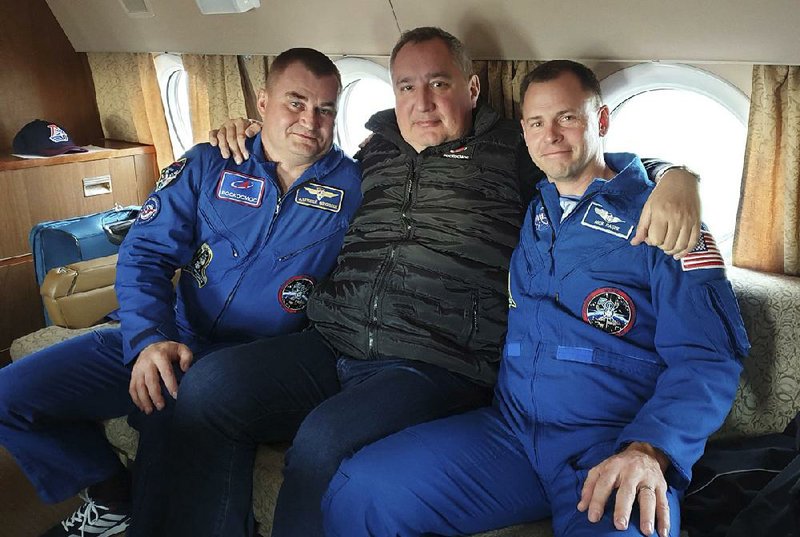MOSCOW -- NASA's top official suggested Friday that a new mission to the International Space Station could take place this year after Russian experts address the cause of a Soyuz rocket malfunction, which sent the crew on a harrowing escape from the outer edge of the stratosphere.
"I fully anticipate that we will fly again on a Soyuz rocket, and I have no reason to believe at this point that it will not be on schedule," NASA Administrator Jim Bridenstine told reporters.
That could mean another launch before mid-December, when the three crew members on the space station -- an American, Russian and German -- were scheduled to end their six-month mission.
"No changes have been made. The investigation is underway," Bridenstine added.
A Soyuz capsule attached to the station that the crew will use to ride back to Earth is designed for 200 days in space, meaning that their stay in orbit could only be extended briefly.
"We don't have an opportunity to extend it for a long time," said Sergei Krikalyovi, the head of the Russian space agency Roscosmos' manned programs.
Russian space launches were suspended Thursday after the booster malfunctioned about two minutes after liftoff -- about 31 miles above the surface -- with NASA's Nick Hague and Russian cosmonaut Alexey Ovchinin aboard. Both men landed safely on the grassy steppes of Kazakhstan after jettisoning away in their capsule.
Russian rockets are the only way to reach the orbiting laboratory, but Bridenstine said the rocket failure -- Russia's first such incident in the post-Soviet era -- had not tarnished his view of the venerable Soyuz rockets.
NASA said Hague and Ovchinin experienced more than six times the force of gravity before tumbling onto an expanse more than 200 miles from the Russian-operated Baikonur Cosmodrome in Kazakhstan.
Russian technicians are conducting an investigation into the rocket failure.
"I think the investigation is going to go swiftly," Bridenstine said, but gave no further details on the preliminary findings.
Krikalyovi said one of the rocket's four boosters failed to separate from the main stage. All Soyuz flights, both manned and those carrying vital supplies such as food and equipment, have been suspended pending the outcome of the investigation.
Hague and Ovchinin remained under medical observation Friday.
Recalling the moment Bridenstine realized something had gone awry with the launch, he said hearing Hague speak Russian confirmed his fears.
"My immediate reaction was, 'Things are not going well. He's not speaking English.'" Hague's words -- in which he described the sharp drop in gravity -- were then translated into English. All members of the Soyuz crew must learn Russian.
About 34 minutes elapsed from the time the rocket failed to when the capsule finally parachuted to a landing, where rescue crews swiftly picked up the pair.
Bridenstine praised the Soyuz emergency rescue system, saying it functioned like a "miracle."
"Even when a failure occurs, because of the engineering and the design and the great work done by folks in Russia, the crew can be safe," he said. "That's an amazing capability and we can't understate how important it is. Not every mission that fails ends up so successfully."
Hague also expressed his gratitude.
"Thank you all for your support & heartfelt prayers," he tweeted. "Operational teams were outstanding in ensuring our safety & returning us to family & friends."
Dmitry Rogozin, the chief of Roscosmos, promised that both men will be given another chance to reach the space station.
"The boys will certainly fly their mission," Rogozin tweeted, posting a picture in which he sits with the two astronauts aboard a Moscow-bound plane. "We plan that they will fly in the spring."
Information for this article was contributed by Amie Ferris-Rotman of The Washington Post; and by Vladimir Isachenkov and Nataliya Vasilyeva of The Associated Press.
A Section on 10/13/2018

